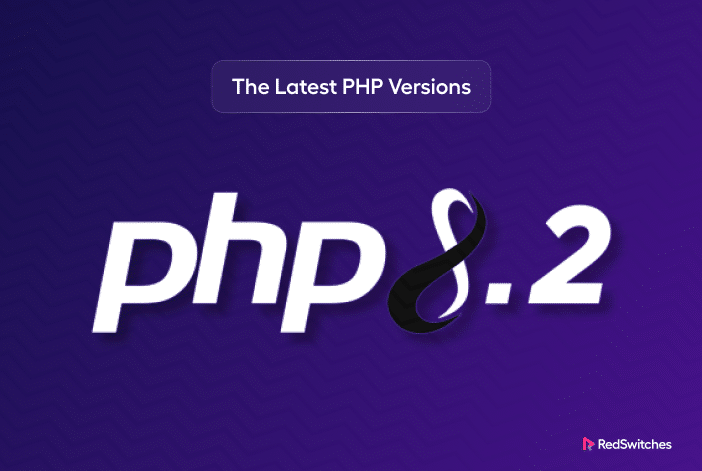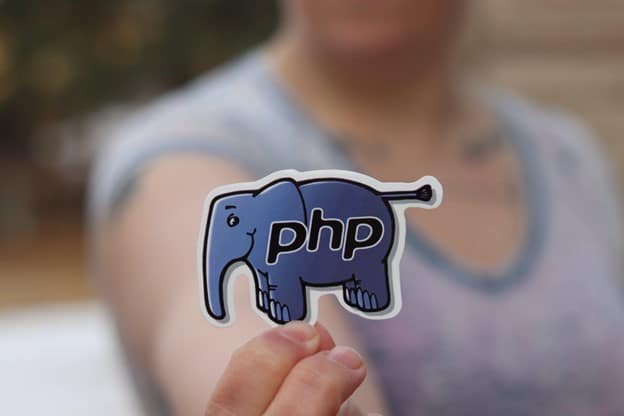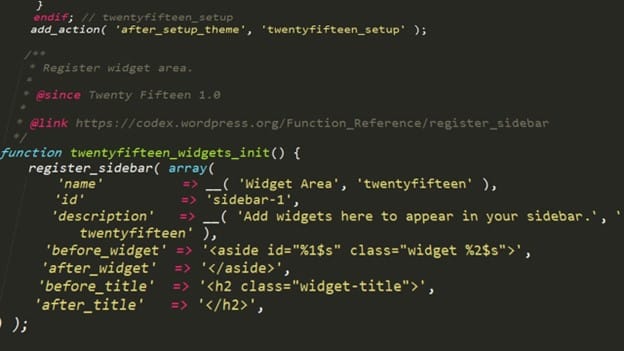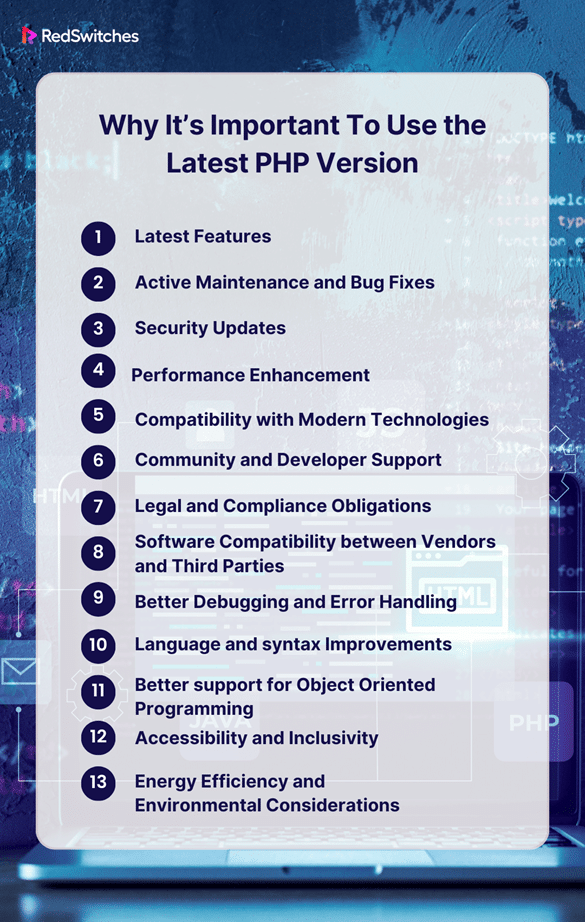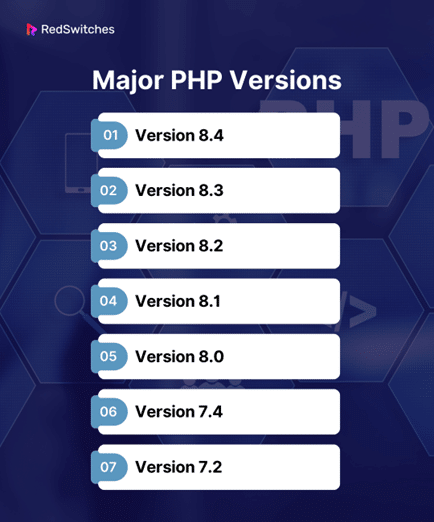Welcome to our newest blog post explaining the complexities of the PHP latest version! It is essential to stay current with the newest tools and technology in the always-changing field of web development.
Our objective is to provide developers with in-depth knowledge of PHP’s improvements in the PHP latest version so they can use the most advanced tools for their web development projects. We will also explore the PHP new version.
We strive to equip developers with the information they need to better their abilities and produce reliable, effective, and secure online applications as we delve into the features and enhancements added in the most recent PHP versions. Join us as we explore the dynamic world of PHP, where practicality meets innovation, and developers discover the tools they need to succeed in the digital era.
Table of Contents
- What Is PHP?
- Why It’s Important To Use the Latest PHP Version
- Latest Features
- Active Maintenance and Bug Fixes
- Security Updates
- Performance Enhancement
- Compatibility with Modern Technologies
- Community and Developer Support
- Legal and Compliance Obligations
- Software Compatibility between Vendors and Third Parties
- Better Debugging and Error Handling
- Language and Syntax Improvements
- Better Support for Object-Oriented Programming
- Accessibility and Inclusivity
- Energy Efficiency and Environmental Considerations
- How To Tell Which PHP Version You’re On
- How to Update Your PHP Version
- A Guide to PHP Versions
- Conclusion
- FAQs
What Is PHP?
Credits: Pexels
PHP is a free, server-side, open-source programming language that may be used to build websites, programs, CRM systems, etc.
It is a universally accepted language that can be included in HTML. Since its compatibility with HTML, PHP has continued to be a favorite among developers since it simplifies HTML coding.
PHP is an acronym for “PHP: Hypertext Preprocessor,” with the original meaning of the term “Personal Home Page” within it. Since its introduction in 1994, the acronym has been altered to better appropriately reflect the essence of the phrase as the language has evolved.
As of 2022, there have been 8 iterations of PHP since its initial release, with version 8.1 currently being the version most people use for their websites.
Why It’s Important To Use the Latest PHP Version
Credits: Pixabay
In this section of our blog, we will understand why it is very important to use the PHP latest version.
Latest Features
The most recent versions of PHP include a wide range of cutting-edge features intended to improve developers’ abilities. These additions simplify development workflows and raise the level of code quality overall. They range from enhanced error handling and improved syntax to potent new functions.
We’ll go in-depth about these improvements and show you how to use them to build stronger, more scalable web applications.
Utilizing the PHP latest version has several noteworthy benefits, including the promise of ongoing support and prompt issue fixes. The developer community for PHP fixes known flaws with each version, resulting in a more streamlined and error-free writing process.
Adopting the most recent version gives developers access to continuing assistance, allowing them to handle problems quickly and concentrate on creating outstanding web solutions.
Moreover, powerful new features introduced in the most recent PHP versions enable developers to design more complex web applications. These features offer tasteful answers that save time and effort by addressing various development-related issues. By thoroughly examining these capabilities, developers can better use their potential and create web apps that are more robust and scalable.
There are many notable advantages for developers using the PHP latest version. A primary benefit is the guarantee of continuous assistance and timely resolution of problems.
With every release, the vibrant PHP development community assiduously fixes identified vulnerabilities, guaranteeing a more efficient and error-free writing process. Using the most recent version improves code quality and offers ongoing support to developers.
Active Maintenance and Bug Fixes
Credits: Pixabay
The promise of ongoing support and prompt problem fixes is one of the most notable benefits of utilizing the PHP latest version.
Every time there is an update, the PHP developer community fixes any bugs that have already arisen, making coding more accessible and error-free. Developers get continuing assistance when they use the most recent version, which helps them fix problems quickly and concentrate on creating unique web solutions.
Moreover, powerful new features introduced in the most recent PHP versions enable developers to design more complex web applications. These features offer tasteful answers that save time and effort by addressing various development-related issues. By thoroughly examining these capabilities, developers can better use their potential and create web apps that are more robust and scalable.
There are many notable advantages for developers using the latest version of PHP. A primary benefit is the guarantee of continuous assistance and timely resolution of problems.
With every release, the vibrant PHP development community assiduously fixes identified vulnerabilities, guaranteeing a more efficient and error-free writing process. Using the most recent version improves code quality and offers ongoing support to developers.
Security Updates
Security is crucial in today’s digital environment. The PHP latest version has crucial security upgrades built in, protecting applications from new threats and weaknesses.
Developers strengthen their codebase by updating to the most recent PHP release, safeguarding private information and sensitive data. This section will discuss the importance of these security updates, emphasizing how they help reduce risks and establish safe online spaces.
Security is critical in today’s digital environment. The most recent PHP versions put security first by adding essential updates that protect apps from new dangers and weaknesses. These security updates are painstakingly designed to mitigate possible threats and guarantee the integrity and confidentiality of critical information.
By updating to the latest version of PHP, developers strengthen their codebase and build a strong barrier against malicious activity. These security improvements create safe online environments for consumers while lessening the possibility of breaches.
The significance of these upgrades is emphasized in this section, along with how they help to lower risks and improve web applications’ security posture.
Performance Enhancement
The PHP latest version has optimizations that improve the efficiency and smoothness of online applications, going beyond small speed increases. These upgrades frequently involve memory reduction, algorithm optimization, and PHP runtime optimizations.
Developers can take advantage of these performance improvements, which include faster response times, lower server loads, and enhanced overall scalability, by updating to the most recent version of PHP.
Faster website and application loads guarantee a flawless user experience—which is especially important in the fast-paced digital world of today. These improvements not only raise user satisfaction but also lower bounce rates and boost engagement, which has a positive impact on online businesses and website owners in real financial terms.
Compatibility with Modern Technologies
Staying aligned with modern technologies is essential for the longevity and relevance of web applications. The PHP latest versions are designed to be compatible with contemporary web technologies, ensuring seamless integration with popular frameworks, APIs, and libraries.
This compatibility extends to emerging technologies like Progressive Web Apps (PWAs), WebSockets, and serverless architectures.
By adopting the PHP latest version, developers can harness the power of these technologies, enabling the creation of dynamic, interactive, and feature-rich web applications. Compatibility with modern technologies also future-proofs applications, allowing them to adapt and evolve alongside the ever-changing tech landscape.
Community and Developer Support
The PHP community is well known for its knowledge, kindness, and readiness to support other developers. Developers can access this extensive knowledge base and support by utilizing the PHP latest version. By participating in the community, developers can cooperate, exchange ideas, and get assistance by accessing forums, email lists, social media groups, and developer meetups.
Furthermore, comprehensive documentation, tutorials, and best practice guides are frequently included with major PHP releases. These resources are the outcome of community collaboration.
Participating actively in this ecosystem advances the abilities of individual developers while also augmenting the community’s aggregate knowledge. Working together encourages creativity, speeds up learning, and guarantees that developers are prepared to take on obstacles.
Legal and Compliance Obligations
It can also be very important to stay current with PHP versions from a legal and compliance standpoint. The use of current software is required to secure data under several regulatory requirements and industry standards, including payment card industry (PCI) standards and data protection rules (such as GDPR).
There may be financial penalties and legal repercussions for breaking these restrictions. Using the most recent version of PHP shows that you are committed to data security and legal compliance, ensuring that your applications follow all applicable guidelines and standards.
Software Compatibility between Vendors and Third Parties
Many contemporary apps depend on different third-party frameworks, libraries, and services. To comply with the most recent industry standards, these components regularly update their features and APIs.
A PHP version that is too old may not work properly with these third-party tools, which could restrict the functionality of your application or result in unexpected errors. Upgrading to the PHP latest version guarantees smooth integration with third-party services and vendor-supplied software, averting possible snags in your development process.
Compatibility with many tools and services expands the capabilities of your application and lets you take advantage of all the resources to improve functionality and user experience.
Better Debugging and Error Handling
More recent versions of PHP frequently provide improved debugging and error-handling features. Developers now find it simpler to locate and fix problems during development and production thanks to these enhancements.
The most recent PHP versions’ comprehensive error messages, stack traces, and debugging features speed up the debugging process and help developers identify and fix issues more rapidly.
Better error handling not only speeds up development but also makes your apps more stable and reliable overall, which makes for a more seamless user experience.
Language and syntax Improvements
As PHP develops, new features and syntactic improvements are added, making complicated coding jobs easier. Developers may now write code that is clearer, more expressive, and easier to comprehend, thanks to these improvements.
To reduce the amount of code writers must write, PHP latest versions frequently provide syntactic sugar, shortened notations, and simplified syntax for common tasks. Developers can benefit from these language enhancements by utilizing the most recent version of PHP, making their codebase more streamlined, manageable, and elegant.
Better support for Object Oriented Programming
Credit: Pixabay
These language improvements improve overall web application code quality and increase developer efficiency.
In contemporary software development, object-oriented programming, or OOP, is a core paradigm. Versions of PHP keep adding features like typed properties, arrow functions, and private class constants to improve support for OOP concepts further.
With these changes, developers can build stronger class hierarchies, encapsulate data, and increase code reusability, all of which aid in constructing modular, maintainable, and scalable applications.
Developers can use these cutting-edge OOP features by updating to the most recent version of PHP. This will permit them to create more complex and adaptable applications that follow best practices in object-oriented programming.
Accessibility and Inclusivity
Credit: Pixabay
Newer versions of PHP frequently come with features and improvements meant to make web apps more inclusive and accessible.
Semantic markup advancements, compliance with web content accessibility rules (WCAG), and enhanced support for assistive technology are possible developments. Developers may guarantee their apps are inclusive of persons with disabilities and offer an accessible online experience by using the most recent version of PHP.
In addition to meeting legal requirements, accessible web apps improve usability and provide a more welcoming environment on the internet for all users by catering to a broader user base.
Energy Efficiency and Environmental Considerations
Resource utilization is frequently optimized in newer versions of PHP, which improves energy efficiency. Web servers use less energy because efficiently designed code uses fewer server resources.
Energy efficiency is an important area to consider in today’s ecologically conscious world. Developers can make a good impact on the internet ecosystem by utilizing the most recent version of PHP and creating optimized code. Energy-efficient apps are both financially and environmentally sound decisions because they use less energy and have a positive impact on the environment, as well as data centers and web hosting companies.
How To Tell Which PHP Version You’re On
Whether you are using PHP latest version or not, finding out which version of PHP is installed on your server is essential for several reasons, such as making sure you have the most recent security patches and feature compatibility with your apps. There are two popular ways to determine which PHP version is installed on your server:
phpinfo() of phpversion() functions
phpinfo() Function
- Using a text editor, create a PHP file (such as phpinfo.php) in the document root of your web server.
- Include the line of code that follows in the file:
- Save the file and open it in your browser (http://yourdomain.com/phpinfo.php, for example).
- A thorough page showing the different PHP setups, including the PHP version, will appear. To determine the precise PHP version number, look for the “PHP Version” section.
phpversion() function
- You can easily find out the PHP version in your PHP scripts by using the phpversion() method.
- This script will output the PHP version straight into your web browser when you run it.
- The phpversion() function is straightforward and can be used within your PHP code. Simply write:
<?php
echo "PHP Version: " . phpversion();
?>
By running this script, it will display the installed PHP version directly on your web page.
WordPress Dashboard
You can also verify your PHP version using the WordPress dashboard if you’re using it:
Enter Your WordPress Dashboard Login
- In the address box of your browser, type the domain of your website followed by /wp-admin.
- Enter your WordPress credentials to log in.
Enter the Site Health Tool’s URL
- Navigate to “Tools” in the WordPress dashboard, then select “Site Health.”
- A summary of the functionality and health of your website may be seen here.
Verify the PHP version
- Click the “Info” tab in the Site Health tool.
- Seek out the “Server” or “Server Configuration” section.
- There should be information regarding the PHP version on your server.
How to Update Your PHP Version
Credits: PHP Website
Before moving on to the core topic of our blog PHP latest version, we will learn how to update your PHP version.
For security, speed, and compatibility with the newest apps, you should update your PHP version. Here’s how to upgrade the version of PHP that you’re using on Ubuntu, Debia, and Linux.
On Linux, Debian, or Ubuntu systems, the package manager apt can be used to update PHP. To update your PHP version, take the following actions:
Make Package List Updates
The following command should be entered into an open terminal window to update the package lists from the repositories:
sudo apt-get update
Installed Package Upgrade
Upgrade all installed software, including PHP, to the most recent versions after updating the package lists:
sudo apt-get upgrade
Set up the PHP repository
Add the repository containing the desired PHP version if you wish to update to a version of the language that isn’t accessible in the default repositories. For instance, run the following scripts to add the PHP 7.4 repository:
sudo apt-get install software-properties-common
sudo add-apt-repository ppa:ondrej/php
Upgrade PHP
Use the apt command to update PHP after adding the repository. Indicate which version of PHP you wish to install. For instance, use these to install PHP 7.4:
sudo apt-get install php7.4
Verify PHP Version
To make sure the update was successful, check the PHP version when the installation is finished. Launch a terminal, then enter:
php -v
A Guide to PHP Versions
Coming to our blog’s core section, we will discuss the Major PHP versions.
Version 8.4
The current development target for new features, significant updates, and RFCs is PHP 8.4, the active development branch. General release is anticipated for 2024. Version 8.4 will be the PHP latest version to date.
Version 8.3
PHP 8.3 improved the language’s capabilities by introducing several essential features. One noteworthy addition is the json_validate method, which offers a quick and easy means of validating JSON input.
Developers may now work with class constants and enums more dynamically and flexibly thanks to support for dynamic class constants and enum member fetch operations. These additions increase PHP’s adaptability and enable programmers to design more complex applications.
Version 8.2
In PHP’s quest to modernize the PHP language, PHP 8.2 marked a significant turning point.
An important turning point in the ongoing PHP language modernization efforts was reached with PHP 8.2. This version prioritized language simplification in addition to introducing intriguing new features. PHP 8.2 strongly recommends developers build better maintainable code and adopt best practices by deprecating support for dynamic class properties. The current php stable version is php-8.2.12.tar.gz (sig)
To encourage cleaner configuration configurations, warnings are generated for certain suboptimal INI configuration variables. To guarantee consistent and predictable results, legacy PHP behaviors that affect array sorting and specific string transform/encode operations were also addressed. The current PHP version is 8.2.6.
Version 8.1
The advancement of the type system in PHP is continued in version 8.1. Additionally, it increases the characteristics that support defensive programming.
Version 8.1 of PHP significantly improved the type of system that encourages defensive programming techniques. PHP 8.1 has several important additions, including first-class callable syntax, never-return types, intersection types, read-only attributes, and support for enums and fibers.
With these improvements, developers may now write more durable and dependable code while also enhancing the expressiveness of the language. It is important to keep in mind, though, that PHP 8.1 deprecated some features; therefore, upgrading PHP programs that already exist must be done carefully.
Version 8.0
On its 25th anniversary, PHP 8.0 introduced a number of significant additions, including Union Types, JIT, Constructor Property Promotion, Match Syntax, Named Parameters, and other enhancements to performance, syntax, and user experience.
PHP 8.0 is an important milestone in the history of the language because of these additions, which not only improved efficiency but also the syntax and general user experience.
Version 7.4
On November 28, 2019, the PHP programming language released version 7.4, which is now widely used. The language was strengthened and given new elements, which increased its effectiveness.
The introduction of arrow functions improved code readability by giving anonymous functions a clear syntax. Improvements were made to the typed properties, and preloading was added to improve performance greatly.
Additionally, conditional assignments were streamlined by introducing the coalescing assignment operator, which offered a practical means of assigning variables based only on their existence. Together, these improvements improved PHP’s expressiveness and performance, leading to the developer community’s widespread adoption of version 7.4.
Version 7.2
On November 17, 2017, the PHP development team announced the release of PHP version 7.2. The PHP 7 series received its second feature update with this release.
A number of improvements and new features were added in this release to increase code efficiency and developer productivity.
Among the noteworthy innovations were object type hinting, non-countable object counting, and the ability to change numeric keys in object/array casts. Developers now have access to a more robust and adaptable programming language thanks to these advancements that streamline many areas of PHP.
Because of this, PHP 7.2 started to gain popularity among developers looking to improve the functionality and performance of their applications.
PHP 7.2.0 includes a number of enhancements and new capabilities, including
- Number keys in object/array casts can be converted
- Non-countable object counting
- Object typehint
Conclusion
In conclusion, any web developer or company owner must comprehend the evolution of PHP, from its core concepts to the most recent releases. As we examined the importance of utilizing the PHP latest version, it became clear that keeping up with trends does not always translate to security, performance, and the capacity to utilize cutting-edge features.
Accepting the language’s improvements, from PHP 7 and prospective future releases, is crucial for reliable online applications and pleasant user experiences.
A dependable hosting partner like RedSwitches drives this technological advancement. Businesses may implement the most recent PHP versions with confidence thanks to their cutting-edge infrastructure and knowledgeable support, knowing they have a reliable ally in the constantly evolving digital landscape.
FAQs
Q What is the latest version of PHP, 2023?
The latest version of PHP in 2023 is PHP 8.2, which continues to bring advanced features and improvements to the PHP programming language, enhancing developers’ capabilities and application performance.
Q Is PHP 7.4 end of life?
Yes, PHP version 7.4 is end-of-life, which means it no longer receives official support or updates from the PHP development community. It is highly recommended to upgrade to a supported and actively maintained PHP version to ensure security and stability in your applications.
Q When was PHP 8 released?
The release date of PHP 8 was on 26 November 2020. This version introduced several groundbreaking features, including Union Types, Just-In-Time (JIT) compilation, and improvements in performance and syntax.
Q Is PHP 8.2 stable?
Yes PHP 8.2 Version is stable. It incorporates bug fixes, enhancements, and new features, making it a robust choice for modern PHP development. Developers can confidently use PHP 8.2 for their projects, taking advantage of its stability and the latest improvements in the language.
Q What is the basic difference between PHP 7.4 and 8?
Compared to PHP 7.4, PHP 8 brought about considerable efficiency improvements and new capabilities, such as named arguments, union types, and just-in-time compilation.
Q What are the new features in PHP 8.1?
PHP 8.1 introduces several new features and improvements such as support for enumerations, readonly properties, license compatibility checks, and more.
Q What is new in PHP 8?
PHP 8 introduced major features and improvements including Just-in-Time (JIT) compilation, Union Types, Attributes, Named Arguments, and more.
Q How can I test my PHP code?
You can test your PHP code by running it on a PHP server or using a local development environment like XAMPP or WAMP.
Q Is PHP 5.6 still supported?
No, PHP 5.6 is no longer actively supported. It reached its end of life in January 2019. It is recommended to upgrade to a newer version of PHP for security and performance reasons.
Q How do I disable PHP errors?
To disable PHP errors, you can modify the error_reporting directive in the php.ini file or set it dynamically within your code using the error_reporting() function.
Q What are some popular PHP frameworks?
Some popular PHP frameworks are Laravel, Symfony, CodeIgniter, and CakePHP.
Q Can I host WordPress on PHP 8?
Yes, WordPress is compatible with PHP 8. You can host your WordPress site on PHP 8 for improved performance and security.
Q Are there any benchmark comparisons between different PHP versions?
Yes, there are benchmark comparisons available that measure the performance differences between different PHP versions. These benchmarks can help you determine the impact of upgrading to a newer PHP version on your application’s performance.
Q What are the major versions of PHP?
The major versions of PHP include PHP 5.x, PHP 7.x, and PHP 8.x. Each major version introduces significant changes and improvements to the language.
